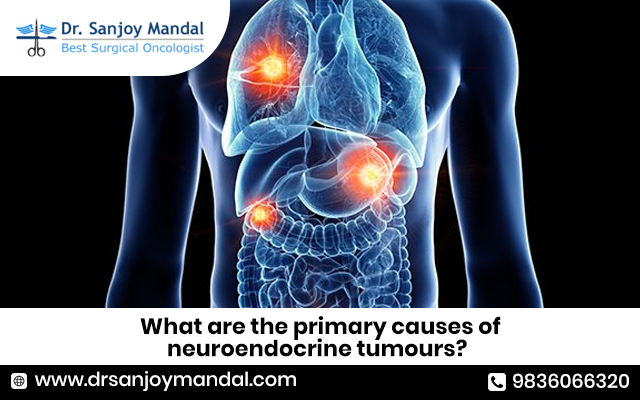Today, I want to delve into a topic that might seem complex at first glance but is crucial for understanding certain types of tumours: neuroendocrine tumours. As a physician dedicated to your well-being, it’s essential to shed light on the primary causes of these tumours so that you can be informed and empowered in your health journey. Of course, you can consult the best neuroendocrine tumour treatment doctor in Saltlake, Kolkata, to better understand the situation.
What are Neuroendocrine Tumours?
Before we delve into the causes, let’s briefly understand what Neuroendocrine Tumours NETs are. , these tumours develop from cells of the neuroendocrine system, which is responsible for producing hormones that regulate various bodily functions. These tumours can occur in different body parts, such as the pancreas, gastrointestinal tract, lungs and other organs.
Genetic Factors Play a Significant Influence
Genetic predisposition plays a crucial role in the development of neuroendocrine tumours (NETs). Specific genetic syndromes, such as Multiple Endocrine Neoplasia type 1 (MEN1), Neurofibromatosis type 1 (NF1) and Von Hippel-Lindau (VHL) syndrome, increase the risk of developing NETs. In these syndromes, specific genetic mutations disrupt the normal regulation of cell growth, leading to the formation of tumours in the neuroendocrine system.
Environmental Factors Causing Potential Triggers
While genetics play a significant role, environmental factors also contribute to the development of neuroendocrine tumours. Exposure to certain substances or ecological toxins may increase the risk of tumour formation.
For example, exposure to tobacco smoke has been linked to an increased risk of lung neuroendocrine tumours. Additionally, exposure to certain chemicals or carcinogens in the workplace or environment may affect tumour development.
Hormonal Imbalances Disrupting the Body’s Balance
Hormones play a vital role in regulating various physiological processes in the body. Any imbalance in hormone levels can potentially lead to the development of neuroendocrine tumours.
For instance, conditions such as hyperinsulinemia, which is characterized by elevated levels of insulin in the blood, have been associated with an increased risk of pancreatic neuroendocrine tumours.
Chronic Conditions Resulting in Underlying Health Challenges
Certain chronic conditions may predispose individuals to the development of neuroendocrine tumour. For example, chronic inflammation and inflammatory bowel diseases, such as Crohn’s disease and ulcerative colitis, have been linked to an increased risk of gastrointestinal neuroendocrine tumours. Additionally, conditions that affect the endocrine system, such as diabetes mellitus and thyroid disorders, may also contribute to developing NETs.
The Role of Age and Gender
Age and gender also play a role in the development of neuroendocrine tumours. While these tumours can occur at any age, they are more commonly diagnosed in individuals over 60. Additionally, some types of NETs may prefer a particular gender. For example, carcinoid tumours of the gastrointestinal tract are more common in women than in men.
By staying informed and proactive about your health, you can take steps to mitigate risk factors and detect any potential issues early on. Remember, knowledge is power when it comes to your well-being. Also, speaking to the best neuroendocrine tumour treatment doctor in Saltlake, Kolkata, is the wisest decision to ensure you take all the proper steps.
